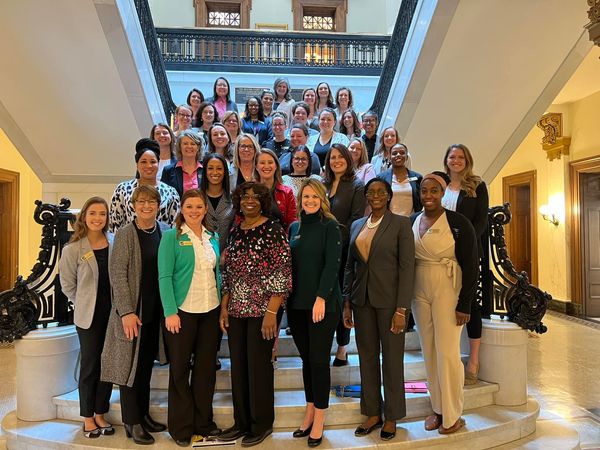
Written by Jeff Haldiman and published in the Jefferson City News Tribune 6/27/2022
When you walk into the office of Missouri Supreme Court Justice Mary Russell, you’ll see a picture of a 12-year-old girl with one of her cows.
The picture is of Russell and she often looks fondly at it knowing the girl had no idea she would one day sit on Missouri’s highest court.
“None of my family had a legal background,” Russell said. “My dad was a dairy farmer, and my mother was a housewife. We were a very traditional farm family in Hannibal. I think my father would have been happy if I decided to be a dairy farmer.
“My mother wasn’t quite sure why I went to law school because she didn’t understand why I needed all that education,” she said. “I was fortunate to be raised by a hard-working family. They taught me a lot of good values.”
Russell planned to be a medical dietitian when she graduated from high school, but as she went through her college education at what is now Truman State University, she changed her major to journalism.
“One of my first internships was at the Hannibal Courier-Post, and it was there that I got introduced to the judiciary because my beat was the local courthouse,” Russell said. “I didn’t know what I was doing, but a really nice trial court judge sat me down and explained the process of criminal proceedings. The judges took an interest in me and helped me become a better reporter. Someone once asked me before I went to law school what was my favorite job, and hands down it was being a reporter.”
It was the exposure to the courts in her reporting internship that got Russell interested in working in the courts. Internships in Jefferson City and Washington, D.C., exposed her to how the lawmaking process worked.
Eventually, Russell went to law school and, “The one thing I knew was that I never ever, ever, ever wanted to work in a courtroom. Now I work in a courtroom, so the moral to the story is, ‘Never say never.’
“At the time, I just didn’t have the confidence,” Russell continued. “I didn’t think I had the public speaking ability you would need. I just could not see myself standing up in a courtroom and advocating for someone, making a mistake and having someone receiving a lengthy prison sentence because of my poor advocacy skills. Perhaps it’s like riding a bicycle. The more you do of anything the better you get.”
In 2023, Russell will once again serve as chief justice of the state’s highest court.
Unlike the U.S. Supreme Court, where the chief justice’s job is a lifetime appointment, Missouri judges rotate the post every two years. Russell held the position from 2013-15.
“It gives everybody a chance to have the leadership role,” Russell said.
Russell said the judiciary in the state is working effectively and efficiently, especially having just come off the stress they faced in dealing with the COVID-19 pandemic.

“They’ve had to be innovators and inventors in finding ways to remain functioning,” Russell said. “Our courts never closed. Despite having restrictions, we found that with our technology today we were actually able to have more participation in court proceedings.”
During Russell’s first term as chief justice, all courts began to be able to take cases by “e-filing,” which eliminated the need for someone personally to deliver legal documents to a courthouse.
The change also made it easier for a judge to be reached “anywhere in this state, any time of the day or night” when a signature is needed for warrants, orders of protection or other emergency documents.
“Now our court voted to try and open up remote access to case.net, the state’s automated case management system,” Russell said.
Currently, residents can find out the status of their case, when the next court date is and other basic information from any computer.
“It’s taken awhile to accomplish this because lawyers will have the responsibility of redacting confidential information about clients in pleadings since that would be out there on the worldwide web,” Russell said.”Hopefully it will be a reality sometime next year that you can get that information while you’re on your home computer.”
During her last term as chief justice, Russell did what she called “undercover judge” work, where she’d go to courthouses dressed as a regular resident and sit on benches in the courthouse hallways. She’d listen to people talk about their courtroom experiences and said she might do that again after she gets back into that position next year.
“I got the idea from the Undercover Boss TV show, and I thought there was a lot I could learn about trial courts since I hadn’t been there as a participant for a number of years,” Russell said. “I would go to courthouses and talk to people, whether they were a witness, prosecutor or in an orange jumpsuit, just to see how their experience was. I wanted to see if they felt they had barriers to access to justice. Did they know where to go in the courthouse? Did they understand what the judge said? Or did the judge listen to what they had to say? I wanted to make sure they felt they were given a fair opportunity to present their case.”
Russell said she found many people were scared because it was their first appearance in a courthouse.
“They were nervous because they had a lot at stake, whether it was criminal case or dealing with the custody of their children,” Russell said. “I had forgotten that a lot of times the things we (as judges) read about are on a screen. These are people with real problems and real emotions. It was very good for me to be reminded about that.”
Russell said she also found that people had a great deal of faith and trust in the judicial system to solve their problems — not just legal but also societal.
“It could be drug abuse, DWI or something related to a veteran, so now we have several speciality courts that help try to solve some of these issues,” Russell said. “I think these courts have done a great job of helping save some people to become productive members of our society and not repeat offenders.”
Russell said one of her biggest jobs as judge is enlightening the public on what the courts do.
“Civics education is a passion of mine, and unfortunately the knowledge about how government works has eroded among the public over the last several years,” Russell said. “The courts are probably the least understood branch of government, so I enjoy getting the chance to speak to organizations or schools to explain how we work.”
When she does speak, Russell said, she emphasises all judges take an oath to uphold the constitutions of the United States and the state of Missouri.
“We look at the laws as written by our legislature, and unfortunately there are times where there will be a statute that is applied to the facts of a certain case and it produces a result that nobody likes,” she said. “But we have to follow the words as written in the statute. Unfortunately, sometimes there have been occasions where we’ve had to strike down a portion of a statute for violating the state and federal constitutions. It’s nothing we do lightly.”
When Russell speaks with groups, she often gives them a view from the bench. She will lay out the case and ask the group how they would reach a decision.
“I’ll show them the statute they have to interpret with the facts that we had been given,” she said. “Many times, they’ll come up with a decision they don’t like either, but they realize they have to follow the words in the statute.”
Looking into the future, Russell said, she is excited for the younger generation and the potential paths they can take, whether it be in law or another field of endeavour.
“I’m a product of the American dream because what I’m doing wasn’t even dreamable when I was growing up,” Russell said. “I had a young intern recently ask me if I thought if there was a chance for an average person to become a judge. I about fell out of my chair and told her to dream bigger than I did.”


